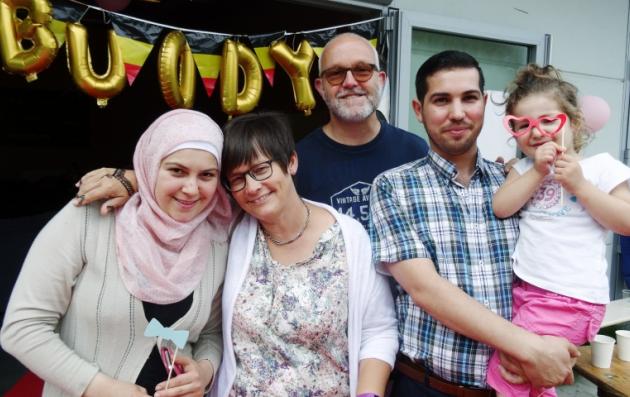Summary
The city of Ghent is facing a growing number of refugees. In Belgium, the number of asylum applications doubled within one year. 60% receive asylum status. As a local government, Ghent believes in a proactive approach, starting the integration process from Day One.
The moment asylum-seekers arrive, they are brought into contact with relevant organisations. In this way they can quickly access language courses, volunteer work, leisure activities. This is a two-sided approach speeding up the integration process, and allowing organisations and citizens to get to know newcomers. It also addresses negative stereotypes and prejudices against refugees.
To coordinate this, a Refugee Taskforce was set up involving everyone who can play a role in dealing with the growing number of new arrivals. This is a cooperation between the political level, city administration, citizens and civil society. The structure allows clear roles and responsibilities to be set.
The solutions offered by the good practice
To handle the range of services needed by refugees, a Refugee Taskforce was set up uniting the political level, city administration and civil society. This holistic approach allows us to tackle challenges on diverse fronts.
- Shelter. Due to the refugee crisis a new refugee shelter was set up. Cooperation between the three shelters was established; as such, information, experiences and good practices can be exchanged.
- It's important to have a good information exchange with citizens. Information sessions and a dedicated web site give people the chance to visit the shelter. By giving accurate information and involving society from the beginning we can demystify stereotypes and raise awareness.
- A coordinated approach makes sure that fundamental rights such as housing, education and work can be accessed quickly and effectively. The moment asylum seekers arrive in Ghent, they are brought into contact with relevant organisations to start language training, do volunteer work etc. The integration process starts immediately, while waiting for recognition. This is a win-win for both newcomers and host society.
- Engagement of civil society. The refugee crisis brought about a huge wave of solidarity: NGOs, volunteers and citizens offer their assistance. As a local authority, we can align these initiatives and offer professional guidance. As such we can fill the gaps, give a warm welcome and foster solidarity with other vulnerable groups.
Building on the sustainable and integrated approach
This proactive, holistic approach fast-tracks the integration process and makes sure that refugees are included within the host society. By giving them immediate access to language training, volunteer work, leisure activities, assigning a local buddy, newcomers are being empowered socially and economically. Refugees also love to contribute to the host society with their skills and talents. The Refugee Taskforce is a cooperation between the political level, city administration and civil society.
Based on a participatory approach
A coordinated Refugee Taskforce involves all the relevant stakeholders: city services (e.g. Service on Asylum and Refugee Policy, Service of Welfare and Equal Opportunities), the Public Service for Social Welfare, local NGOs and independent volunteers. By involving volunteers, NGOs and refugee shelters, the actions we take as a local authority are based on the needs of the people. The refugee crisis brought about a huge wave of solidarity: NGOs, volunteers and citizens all wanted to give a warm welcome to refugees, by offering assistance, donating materials, inviting people to their houses - taking various initiatives to make them feel at home. As a local authority we can align all these initiatives, e.g. by setting up a dedicated website.
What difference has it made?
Refugees are finding their way through the Ghent society, they know the organisations that can be of help, they have been able to establish a social network, they speak the language and a lot of them are active as volunteers. There has been a huge wave of solidarity towards the refugees, no major negative reactions to these new arrivals. IN-Gent assigned 57 buddies to asylum seekers to help them with their administration, make sure they get to know Ghent and practice their language skills. The Centre for General Wellbeing assigned 56 housing buddies, who help the refugees looking for homes. In September 2016 an ESF project was started; the target of this project is to turn volunteer work into paying jobs for 320 asylum seekers. During the summer of 2016 a social-artistic NGO was able to set up volunteer work for 80 asylum seekers during the summer festivals in and around Ghent. Because this was such a success, it was turned into a project called "Refu interim". This approach leads to sustainable change. The cooperation installed between city administrations, NGOs and civil society leads to new alliances that can also prove efficient and interesting in other contexts.
Why should other European cities use it?
Today, many cities are facing the same challenges as a result of the large and rapid inflow of migrants. A locally coordinated proactive approach can be set up in other cities as well. By giving immediate access to social rights as housing, education, work, healthcare and leisure activities, not only the integration process is being fast-tracked, but negative stereotypes and prejudices against refugees are also addressed.
We are convinced that the Ghent approach is transferable and affordable for other cities. It's a matter of making smart connections in an already existing field of actors that are present in almost every local context. By adding targeted coordination you can maximise the impact, which makes it possible to speed up the integration process.
Moreover, this approach leads to sustainable change. The cooperation installed between city administrations, NGOs and civil society leads to new alliances that can also prove efficient and interesting in other contexts. It's actually a mindset one instils that's not only applicable to refugees. Therefore, it can inspire other cities to adapt this practice to their own context.
-
202_Ghent_GPsummary.pdf(PDF, 233Ko)

